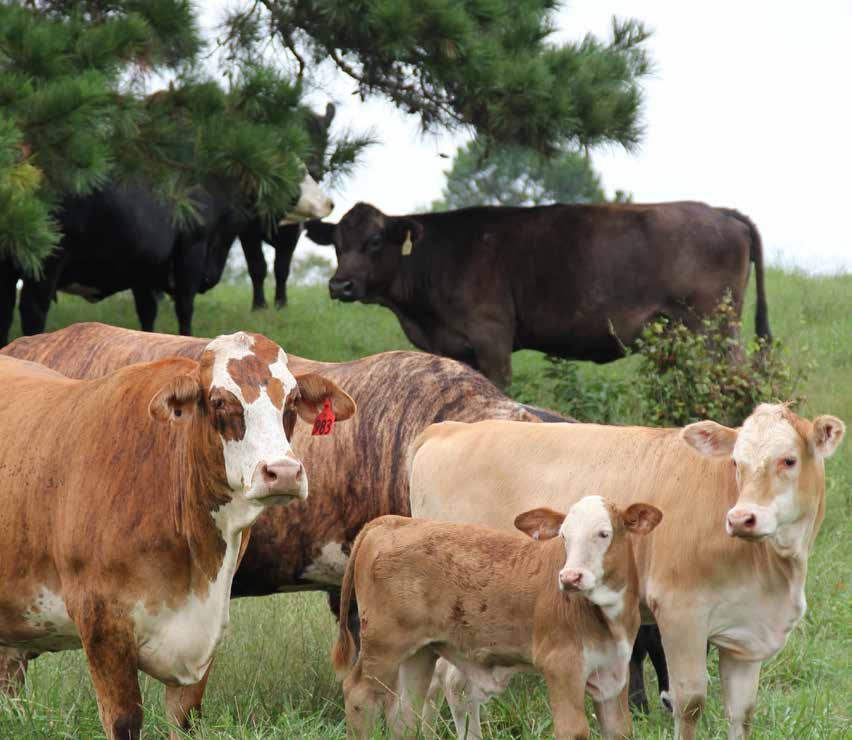
7 minute read
Honoring the Son ; Harnessing the Sun
Faith, teamwork and sustainability drive Faith Farm's Success.
Matt and Jessi Debnar are the people behind Faith Farm in Cherry Hill, AR. They’re a team and they do it all.
Advertisement
Managing the 115-acre farming operation that includes five production broiler houses, 50 head of cattle and a custom hay business is no small task. In addition, they’re committed to sustainability.
Matt and Jessi are quick to correlate their commitment to sustainable practices with their faith.
“Everything we have belongs to God,” Jessi shared. “So we work hard to honor Him in how we take care of it.”
Why solar?
A solar array to power one poultry house and the Debnars' home is the most recent addition to the farm. The couple’s other four poultry houses still operate on traditional electricity. While solar applications for agriculture have existed since the 1970s, the Debnars are the first Polk County farm to make the change according to Rich Mountain Electric Cooperative.
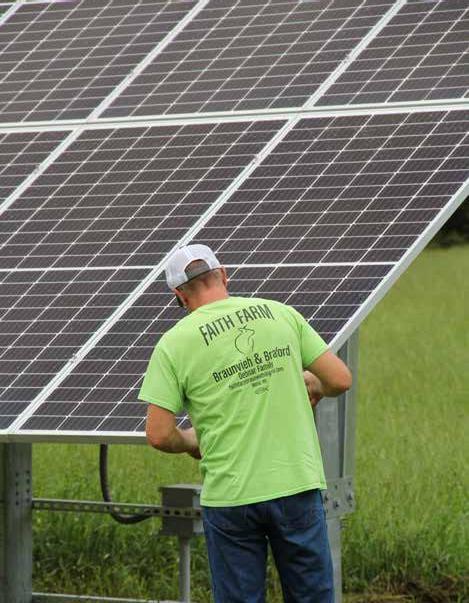
Matt Debnar working on solar panels.
Jill Robertson | Farm Credit of Western Arkansas
“Rich Mountain Electric Co-op has been very supportive,” Matt says. “They understand poultry grower needs and are the first to check on the farm when the electricity goes out.”
“As a farmer, you can just add a zero to all your bills,” Matt smiled. “Sometimes two zeros.”
“It’s about continually looking for ways to save money.”
Matt researched solar energy and became committed to the idea after meeting a designer with Seal Solar at a poultry registration meeting. The designer explained solar options in detail, including annual energy savings.
“We’re starting with one solar array on one poultry house, but we’re open to adding it to additional houses in the future. This first array powers one poultry house and our home,” he continued.
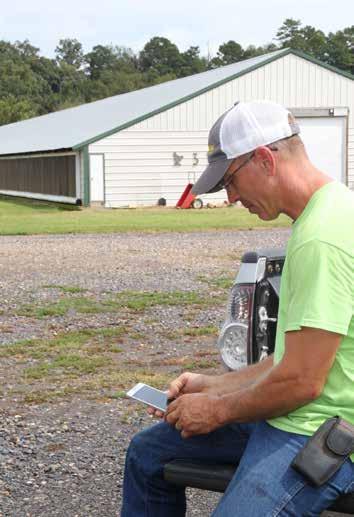
Matt uses an app to monitor solar energy production on the farm.
Jill Robertson | Farm Credit of Western Arkansas
The 110-foot solar array sits adjacent to their first poultry house, next to the generator. The weight of the panels precludes installation on the roof of the poultry house. The array is sized in proportion to their annual energy usage with the goal of zero net energy cost. The solar energy produced is equal to the energy needed by the poultry house and home in one year.
The way Matt looks at it, energy savings, a USDA grant and tax savings mean the solar array will pay for itself in three years.
While a lower electric bill is important, Matt says lessening the farm’s carbon footprint is also a motivator. An app on Matt’s phone allows him to track energy produced and how CO2 emissions prevented through the use of solar energy equate to trees planted. Since June, the solar energy produced at Faith Farm equates with 127 trees being planted.

With solar energy, the Debnars saw a 95% savings in their August electric bill compared to the same month last year.
Jill Robertson | Farm Credit of Western Arkansas
While the solar array has only been in use since early summer, Matt is confident they will be able to easily meet their goal of eliminating an energy bill for the one poultry house and home. He holds out two electric bills to confirm an already dramatic cost savings. Their August electric bill was $21.81, while it was $464.31 last August. A 95% savings for that one-month comparison.
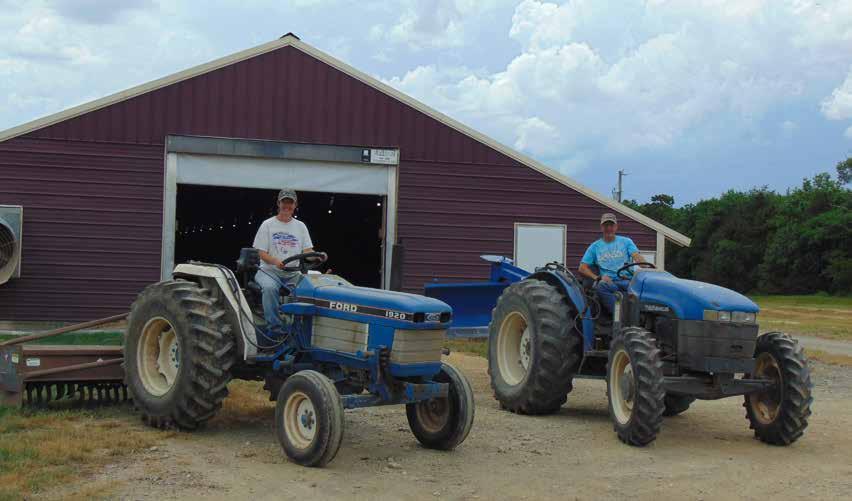
Matt and Jessi approach most farm chores as a team.
Farm Credit of Western Arkansas
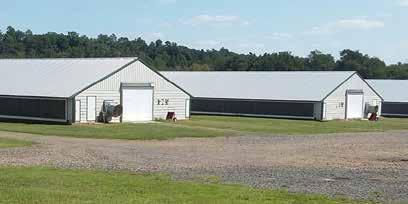
Jill Robertson | Farm Credit of Western Arkansas
Jessi is quick to compliment Matt’s commitment to research and planning and said he’s the one that comes up with the big ideas. Jessi manages poultry operations and Matt manages the cattle.
“Matt’s always thinking ahead about what we should be doing and researching how to do it,” Jessi shared. “And I’m the one who pinches the pennies so we can do it,” she laughed.
“Jessi is the one with twenty years of farm experience,” Matt added. “She’s the farm manager and has the finance and budgeting knowledge we rely on.”
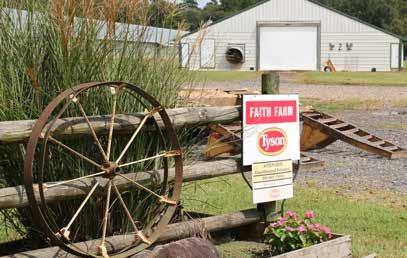
The Debnars grow broilers for Tyson.
Jill Robertson | Farm Credit of Western Arkansas
A Solid Partnership
Jessi may joke about pinching pennies, but it’s obvious the pair is well-suited for their farming partnership.
Jessi began farming in 2000. She purchased her first 35 acres with the dream of poultry farming. As a newly single mother, she wanted a way to earn income while also being home with her two children. Jessi’s parents own poultry houses, so it was familiar to her.
Jessi ran her poultry operation alone until marrying Matt in 2008. Matt had moved to Arkansas in 2006 from Alaska and the couple met on a blind date. Living most of his life in Anchorage, he moved his two children and mother to the Mena area to be near family. He and his mother purchased land and he began working for U.S. Motors. He has a background in carpentry and a diesel mechanic diploma.
Once married, the couple purchased additional land and added four more poultry houses over time. Once Matt began working full-time on the farm alongside Jessi, the couple recognized how their strengths complement one another.
Jessi’s least favorite thing about running the farm alone was dealing with machinery and equipment break downs. Matt is a diesel mechanic. Jessi wanted the farm to grow. Matt saw an opportunity to diversify into cattle and had a vision for raising a unique breed. Jessi wanted a partner on the farm. Matt learned he loved farming.
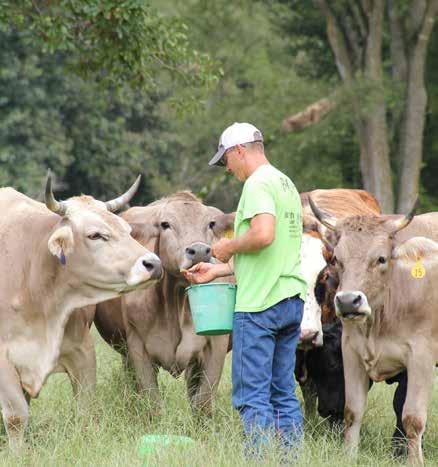
Braunvieh cattle are known for their gentleness.
Jill Robertson | Farm Credit of Western Arkansas
The couple says adding cattle to their business plan came about the same way all their decisions are made.
“Like everything, we prayed about it,” explained Matt.
Jessi had a Jersey milk cow that needed a bottle calf. They found a bottle calf for sale but questioned the price. Matt set about researching the breed and what he learned convinced him that not only was the price for the bottle calf reasonable, but that the breed was advantageous.
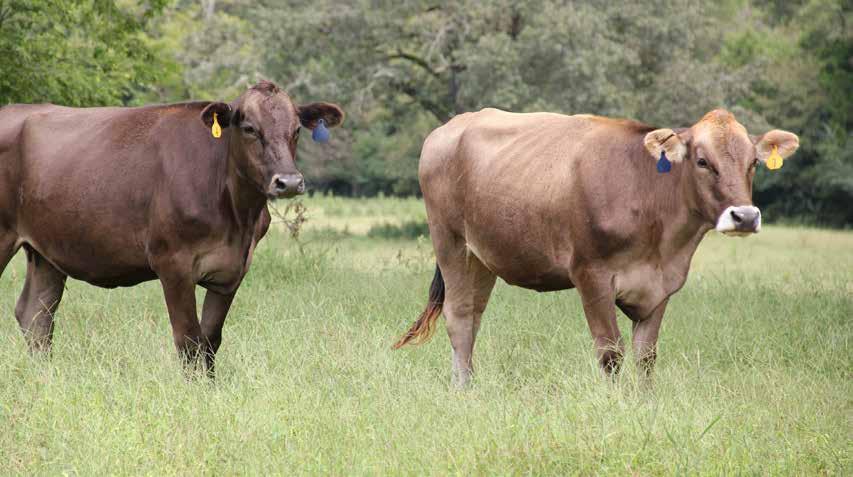
Braunvieh cows
Jill Robertson | Farm Credit of Western Arkansas
That was the start of their registered Braunvieh herd. Braunvieh literally means “brown cow” in German. The breed is known for its gentleness, maternal traits and meat quality. The breed dates to 800 B.C. and hair color varies from light brown with gray to dark brown.
“I’ve heard the breed explained as having the milk of a Jersey and meat of an Angus,” Matt explained.
In addition to registered Braunvieh, their herd includes some tiger stripe Brafords.
Farm Credit’s Role
“Matt and Jessi don’t do anything without thinking it through and having a plan,” explained Vice President and Branch Manager Rex Dollar of the Mena office.
Farm Credit was able to finance the solar array because the Debnars are full-time farmers. While still a unique loan request in western Arkansas, Matt’s research and the couple’s management history made the loan decision an easy one.
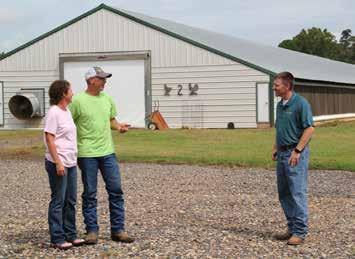
The Debnars talking with Vice President and Branch Manager Rex Dollar.
Jill Robertson | Farm Credit of Western Arkansas
“They are great managers and have proven themselves time and again,” Rex shared.
“They’re very much a team and that sets them apart. When there’s business to discuss, they’re both in my office. They’re always prepared and have a well thought out plan,” he continued.
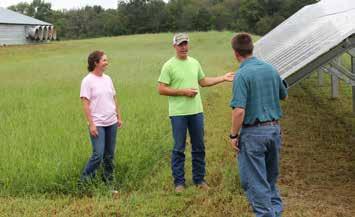
Matt shows the solar array to Rex Dollar.
Jill Robertson | Farm Credit of Western Arkansas
“I appreciate that I can just pick up the phone and let Rex or Heather know what we need,” added Jessi.
Financial Services Specialist Heather Walston in Mena assists the Debnars regularly with loan needs.
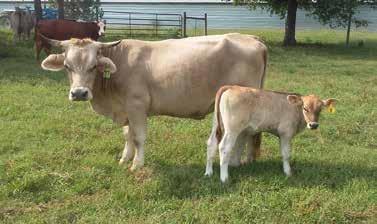
Farm Credit of Western Arkansas
Shared Values Contribute to Success
Raised in Alaska, Matt says farming in Arkansas was the last thing he ever thought he’d do. He attributes landing in Mena and meeting Jessi to God’s plan. Jessi smiles and reaches for his hand in agreement.
“I didn’t know the first thing about farming or cattle or humidity,” he chuckled.
He reiterated that at the end of the day it all belongs to God and he simply wants to hear, “Well done, good and faithful servant.”
Matt also explained that he was surprised to realize there’s always more that needs to be done on the farm. More accurately, things are never done on the farm. Farmers everywhere are nodding in agreement.
But getting it done is what Matt and Jessi are doing daily. Together, they continue to build Faith Farm on teamwork and shared faith.
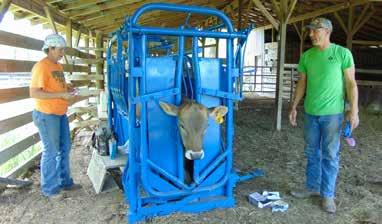
Jessi and Matt working cattle.
Farm Credit of Western Arkansas
Story and photos by Jill Robertson


